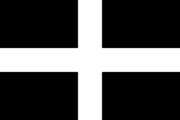
Today is St Piran’s Day and a special day in Cornwall as Piran is regarded as the patron saint of Cornwall (and of tin miners), along with Saint Michael and Saint Petroc. Piran or Perran was an abbot of possibly Irish origin who lived in Cornwall in the early 6th century and later became a saint. His flag (see top right) is a symbol of Cornwall.
Here are a few Cornish phrases related to today (provided by Sam Brown)
– Goel Peran Lowen – Happy Saint Piran’s Day;
Gŵyl Peran Llawen (Welsh); Gouel Peran laouenn (Breton)
– Dydh da ha goel Peran lowen dhis! = Hello and happy Saint Piran’s day!
– A vynnydh ta pasti kernowek? = Would you like a Cornish pasty?
– Gwell yw genev pasti keus hag onyonenn = I’d prefer a cheese and onion pasty.
I haven’t started learning Cornish yet, put have picked up odd bits and pieces of the language and can understand it to a limited extent thanks to my knowledge of Welsh and Breton.
Are any of you learning Cornish?
I had a go at it years ago and got to the point that I was doing some of my journal entries in Cornish – Haven’t revisited it though since the eighties.
I’ve seen ‘goel’ and ‘gool’ for festival. And also Peran and Pyran for the saint. Which is the correct form?
I know there’s been a big orthographical debate within Cornish and understood that it had been resolved. Is it still ongoing?
Some interesting Cornish language stuff here:
http://www.magakernow.org.uk/
Macsen – even with the Standard Written Form of Cornish, which emerged in 2008, the orthographical debates continue. Whenever two Cornish speakers get together it seems that they spend quite a bit a time arguing about how to spell words.
I’m not learning Cornish, although I have spent time poring over maps of Cornwall (as well as Brittany, Cumbria, and S. Scotland) and, using my knowledge of Welsh, trying to work out the meanings of place names. I’ve found that elements similar to Welsh are less common in Cornish place names than I would have expected. This may be partly due to the fact that English has been the dominant (if not sole) language of Cornwall for two centuries or more and has shaped the pronunciation and spelling of many place names, such that their original elements have become unrecognisable. I imagine, if I were to look at a larger scale map, I might find that names of farms and small hamlets are less ‘Anglicised’ and hence more reminiscent of their Welsh counterparts.
At least I now know, from this post, the meaning of the name of the N. Cornish town of Perranporth (‘The Port of St. Piran’, I assume).
@David Eger: There is a pdf (List of place-names agreed by the MAGA Signage Panel) produced by Cornish Language Partnership if you’re interested in Cornish placenames.
http://www.magakernow.org.uk/idoc.ashx?docid=79ba408d-7c02-499e-8cd6-b18dd48de58d&version=-1
Thanks, Yenlit.